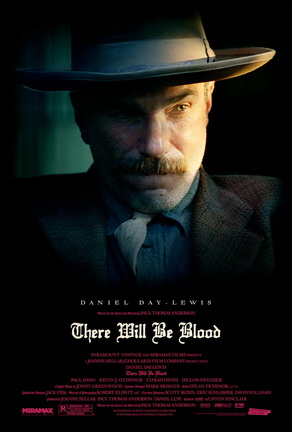 You know how there are some films that you really want to love and that you know that, given your taste in cinema, you probably should love but yet you somehow just cannot bring yourself to actually love?
You know how there are some films that you really want to love and that you know that, given your taste in cinema, you probably should love but yet you somehow just cannot bring yourself to actually love?
To a certain extent, that’s the way I feel about the 2007 best picture nominee There Will Be Blood. It’s a film that I greatly respect, as I tend to respect all of Paul Thomas Anderson’s movies. He’s one of the best director working today and also one of the most consistently interesting. (He’s also probably the only contemporary filmmaker who would actually base a two and half hour epic on the first 150 pages of a forgotten novel by Upton Sinclair.) And I think that There Will Be Blood is a well-made and well-directed film. I also think it’s well-acted, though I do think Daniel Day-Lewis goes a bit too far over-the-top at the film’s conclusion. (If anything, Paul Dano is the one who actually deserved to win an Oscar for his work in this film.) There Will Be Blood is an original work of cinematic art. I’m thankful that it was made and that Anderson stayed true to his vision.
But, with all that in mind, it’s never been a film that I’ve been able to love. Unlike Anderson’s earlier Boogie Nights, There Will Be Blood holds the audience at a distance. We remains outsiders looking in. As a result, the film engages intellectually but not emotionally. It’s a film that earns respect without necessarily winning the audience’s love.
Speaking of respect, that’s something that you have to give to both Daniel Day-Lewis and Paul Thomas Anderson. From the start of the film, Daniel Plainview (played by Day-Lewis) is a cruel and self-centered bastard and that characterization remains consistent throughout. Briefly, it does seem that Plainview might truly care about his deaf, adopted son but, by the end of the film, Plainview has even proven that to be wishful thinking on our part. (The only other character to whom Plainview is consistently pleasant is a young girl named Mary but Day-Lewis plays those scenes with such a corrupt twinkle in his eye that the subtext becomes increasingly creepy.) Give Anderson and Day-Lewis credit. They commit to portraying Daniel Plainview as being an almost Satanic character and, at no point, does either one of them waver in that commitment. As we watch Plainview ruthlessly buy up all the land and drill all the oil that he can find, we wait for him to have some moment of redemption. It took guts for neither Anderson nor Day-Lewis to allow him one.
Paul Dano plays Eli Sunday, an evangelical preacher who stands in the way of Plainview’s efforts to buy up all the land around the Sunday family farm. The film presents Eli and Plainview as being two sides of the same coin. Plainview hides his moral emptiness behind his money. Eli hides behind his religion. The two characters hate each other because they alone truly recognize what they truly are. Dano, who also plays Eli’s brother, gives a mesmerizing performance, one that unfortunately has been overshadowed by Day-Lewis’s work.
It all ends, as all things must, with violent death in a bowling alley. I know that a lot of my fellow cineastes think that the bowling scene is the highlight of the film but, to be honest, this was the point where the film lost me. To me, this was the scene where Daniel Day-Lewis’s performance crossed the line from being flamboyant to shrill. The end just did not work for me.
However, two things that did definitely work for me: Johnny Greenwood’s wonderfully ominous and atmospheric score and Robert Elswit’s amazing cinematography, which made the film’s landscape appear both beautiful and threatening at the same time. The mix of Greenwood’s music with Elswit’s cinematography created some truly haunting moments.
In the end, There Will Be Blood is a lot like Daniel Plainview. It is powerful, memorable, unpredictable, flamboyant, overbearing, and at times a little frightening. And, again much like Daniel Plainview, it’s a film that’s easy to respect and difficult to love.